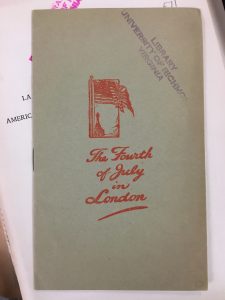
For my Great War Pamphlet, I chose a short booklet from Great Britain entitled, “The Fourth of July in London.” I was interested in this pamphlet the minute I read the title. I immediately wanted to know why the British felt the need to discuss American Independence at a time like this, and what they would have to say on the subject. What I discovered in my reading was far more interesting than I had expected.
The pamphlet, presumably released in July of 1917, is a pairing of two statements, one by Walter Hines Page, the American Ambassador to Great Britain, and the British Foreign Secretary, Alfred J. Balfour. Each man reflects and discusses his thoughts on the United States, Great Britain, and the importance of their relationship with each other.
Though Ambassador Page is rather brief in his statement, he has many thoughtful and meaningful things to say. He of course starts by reminding his readers of the significance behind July 4th: the freedoms his forefathers fought and died for, the rights they earned for future Americans, and the celebrations no doubt taking places throughout the fifty states, though they are an entire ocean away. He then moves into discussing the new era that has begun. Page says the American people have “entered upon a larger crusade to help in an extension of liberty in this Old World” (2-3). Page believes America must be committed to this crusade as a means of holding up the significance of their nation’s creation 140 years ago. Hines says this crusade will inevitably lead to creating “a steadfast friend in freedom” out of Great Britain, and he hopes that future generations will continue to keep this relationship close and strong (3).
In his significantly longer statement, Secretary Balfour very much mirrors the sentiments of his American colleague, while also adding several uniquely British, but no less important thoughts on the American-British alliance. Balfour starts by acknowledging that nations throughout the world admire the United States on this important anniversary, including Great Britain, but in a different way. Balfour says the British “have surely a right to look at it with a special satisfaction,” because “after all, the 13 colonies were the British colonies.” He is perhaps a little smug in saying, the colonies “grew up” under imperial protection, and the various wars the British fought between the 16th and 18th centuries, “enabled those 13 colonies to develop into the nucleus of the great community of which they were the origin.” (4-5)
Balfour also points out the American and the English, aren’t really all that different from each other. He claims the British can feel proud on the Fourth of July because the men who created the United States were “men of our own race, born of the same stock,” born of English heritage, speaking the English language, etc. He continues by reminding the readers that the events of July 4, 1776 represent the final political separation between “the 13 colonies and the Mother Country,” and “not, Thank God, the final separation in sentiment, emotion or in ideal” (5). Though they make up two separate nations, Englishmen and Americans are still very much alike in many ways, and Balfour wants to make sure that fact is remembered, especially at a time of war.
Balfour does not regret or resent the separation between the colonies and the Empire, or the British defeat, for it “ended in the triumphant establishment of the American Republic” (9). He only regrets that the memories of this triumph are tainted by evils of war, defeat and even victory. Balfour believes these negative sentiments have somewhat faded from memory, and that the current generations feel no ill towards one another. He hopes these shared memories can bind the two nations together, and bring them closer together for the future.
Returning to his point about the similarities between the British and the Americans, Balfour says he is proud to be working with the American people in this grave time. He believes “we are working together in all the freedoms of great hopes and with great ideals” (10). What he says next is rather important: “Those hopes and those ideals we have not learned from each other. We have them in common from a common history and from a common ancestry” (10)
Balfour wants everyone to remember that despite their separation and disagreements in the past, the US and Great Britain are on the same side now. Both nations are striving for the same “great aims,” holding “the same hopes” for the future of Western civilization, and are presently bound together in this fight to prevail against “a Power…going to destroy the very root of that Western civilization from which we all draw our strength” (10).
Balfour hopes the nations will “be bound together forever,” and that descendants from both nations will look back at this time of war and see two countries “brought together and united for one common purpose in one common understanding” (11). Balfour urges his readers to remember this idea, this theme of unity. He wants all Americans and all Britons to believe that “we are working together for the best interests of the whole of mankind and for the civilization not only of the Old World but of the new” (11).
The pamphlet shares truly inspirational and encouraging sentiments from both Ambassador Page and Secretary Balfour. Each man understood that this war was about than fighting the Axis powers, about more than creating a world safe for democracy; it’s about reuniting and creating a lasting relationship between two great nations based on the common bonds, interests and memories they already share.

“PERHAPS” a little smug!?! 🙂 Amazing example of burying the hatchet here. And it’s fascinating that one critical common bond is race.
Haha, yeah he was smug, no doubt about it. I agree, I thought it was interesting that race was so important in bonding the two nations.